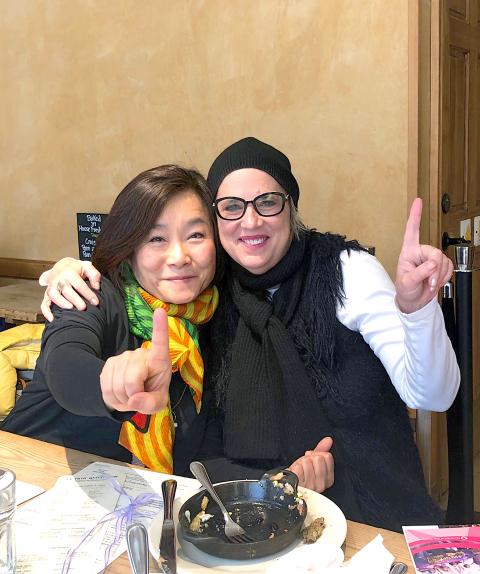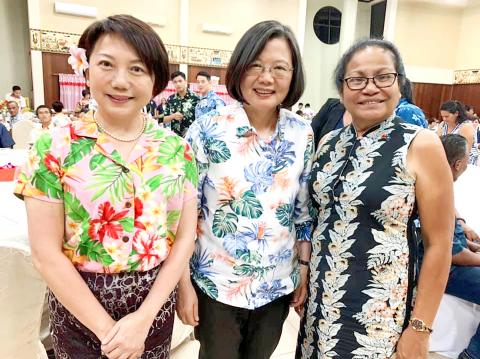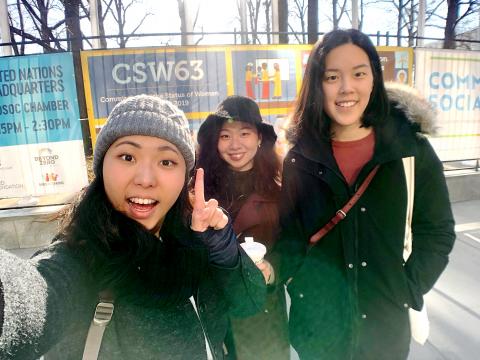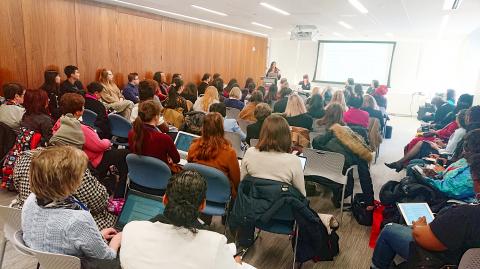Springtime in New York carries waves of diplomats into town to attend the annual meetings of the UN Commission on the Status of Women, the UN’s principal body promoting gender equality.
Before her first time at the meetings this March, Sabrina Hsieh (謝璿), like most young Taiwanese, had only a remote understanding of the country’s diplomatic isolation and its exclusion from the UN since 1971.
“There was a little sadness because in that setting, you are nobody. You can’t even happily say to others, ‘Hi, I’m from Taiwan.’ You have to study their expression and then decide how frank you want to be with them,” Hsieh says.

Photo: Davina Tham, Taipei Times
At home, the third-year university student is a youth activist for women’s economic empowerment. Last month, assisted by the Foundation for Women’s Rights Promotion and Development, she traveled to New York to attend unofficial civil society events held concurrently with the official UN meetings.
Taiwan has for decades been forced to pursue alternative pathways to participate in the international community. The best alternatives capitalize on Taiwan’s strengths and draw on sustained work being done even without government intervention. Efforts toward women’s empowerment and gender equality are emerging as an important locus for international participation.
Close to 50 Taiwanese representatives, chiefly comprising NGO professionals and academics, turned out in force for the UN Commission on the Status of Women this year. They build upon Taiwan’s 20-year presence at the forum, pioneered in 1999 by Chang Chueh (張玨), a veteran women’s rights activist.

Photo courtesy of the Garden of Hope Foundation
With more breathing space than officials, gender equality activists are in a position to enlarge Taiwan’s role in the international community, and the government is taking notice.
Hsieh got to introduce an international audience to her work, and returned home eager to do even more for women and girls here.
TRANSNATIONAL EXCHANGES

Photo courtesy of Fan Yun
The UN does not allow Taiwanese passport-holders to enter UN buildings where official meetings are held. Its participation is limited to the unofficial parallel events — spaces for NGOs commonly held on the sidelines of major UN conferences.
There are a few exceptions. Some of Taiwan’s most experienced advocates have positions in international NGOs that can open doors to observe official meetings. Delegates with dual nationality can also enter using another passport from a UN member state.
But in unofficial settings like the parallel events, doing the work matters more than having the right passport. And this works in Taiwan’s favor.

Photo courtesy of Foundation for Women’s Rights Promotion and Development
When it comes to gender equality, Taiwan has considerable clout as a progressive Asian society. While its reputation is headlined by the 2016 election of Taiwan’s first female president and an impressively high 38.1 percent of legislative seats are held by women, grassroots work rather than political representation is what keeps the conversation going with other countries.
“I do believe that exchanges at the citizen level and among NGOs are more powerful than diplomacy,” says Chi Hui-jung (紀惠容), CEO of the Garden of Hope Foundation.
The foundation’s parallel event this year — socio-cultural attitudes that blame and shame victims of sexual violence — rode the momentum of the #MeToo movement to examine gender-based sexual violence in Asian communities, with speakers from Taiwan, Japan and the foundation’s New York arm.

Photo courtesy of the Garden of Hope Foundation
In November, the Garden of Hope will host the fourth World Conference of Women’s Shelters in Kaohsiung. Some 1,500 people from 120 countries are expected to come together to discuss how shelters are tackling gender-based violence.
The ability to bring internationally-renowned activists to the table and convene global NGO meetings suggests that Taiwan’s non-government sector is punching above its weight in the gender equality movement.
Chi invited prominent US feminist activist Eve Ensler, best known as playwright of The Vagina Monologues, to speak at the conference in New York.
Annie Chang (張琬琪), researcher at the Foundation for Women’s Rights Promotion and Development, says that the different modus operandi for Taiwan’s delegation also has practical advantages.
“There are few countries like us [whose NGOs have] such close proximity to and remain constantly in touch with government officials,” Chang says, adding that this gives NGOs more opportunity to sensitize officials to their priorities and insights.
ACTIVIST AMBASSADORS
The government recognized early on that citizen and civil society exchanges are important, and in recent years has taken more concerted action on this front.
Traveling on a government grant in 2004, Chi established the New York arm of the Garden of Hope Foundation, which shelters female victims of human trafficking and domestic or sexual abuse in New York’s Chinese community.
More recently, President Tsai Ing-wen (蔡英文) appointed Fan Yun (范雲), associate professor at the NTU Department of Sociology and convener of the Social Democratic Party, as Taiwan’s first ambassador-at-large for women’s empowerment.
After visiting New York for the UN Commission on the Status of Women, Fan accompanied Tsai on a whirlwind official tour of three diplomatic allies in the South Pacific from March 21 to March 28.
Fan shines a spotlight on progressive legal protections for women, high female political participation and gender equity education to show that Taiwan is not just a “newcomer” country, but has made notable advances in democratic values and quality of life that shape how other countries can engage with it.
Democratic Progressive Party legislator Lin Ching-i (林靜儀), who has attended parallel events at the UN Commission on the Status of Women since 2012, agrees that Taiwan cannot be absent from international discussions on gender equality.
Given Taiwan’s above-average track record in women’s empowerment and wealth of experience to share, there is mutual benefit in engaging interested groups and activists.
The international community must know that when it comes to gender equality, “Taiwan is a good example, and Taiwan is a good partner,” Lin says.

Last week saw the appearance of another odious screed full of lies from the People’s Republic of China (PRC) Ambassador to Australia, Xiao Qian (肖千), in the Financial Review, a major Australian paper. Xiao’s piece was presented without challenge or caveat. His “Seven truths on why Taiwan always will be China’s” presented a “greatest hits” of the litany of PRC falsehoods. This includes: Taiwan’s indigenous peoples were descended from the people of China 30,000 years ago; a “Chinese” imperial government administrated Taiwan in the 14th century; Koxinga, also known as Cheng Cheng-kung (鄭成功), “recovered” Taiwan for China; the Qing owned

In Taiwan’s politics the party chair is an extremely influential position. Typically this person is the presumed presidential candidate or serving president. In the last presidential election, two of the three candidates were also leaders of their party. Only one party chair race had been planned for this year, but with the Jan. 1 resignation by the currently indicted Ko Wen-je (柯文哲) of the Taiwan People’s Party (TPP) two parties are now in play. If a challenger to acting Chairman Huang Kuo-chang (黃國昌) appears we will examine that race in more depth. Currently their election is set for Feb. 15. EXTREMELY

Jan. 20 to Jan. 26 Taipei was in a jubilant, patriotic mood on the morning of Jan. 25, 1954. Flags hung outside shops and residences, people chanted anti-communist slogans and rousing music blared from loudspeakers. The occasion was the arrival of about 14,000 Chinese prisoners from the Korean War, who had elected to head to Taiwan instead of being repatriated to China. The majority landed in Keelung over three days and were paraded through the capital to great fanfare. Air Force planes dropped colorful flyers, one of which read, “You’re back, you’re finally back. You finally overcame the evil communist bandits and

They increasingly own everything from access to space to how we get news on Earth and now outgoing President Joe Biden warns America’s new breed of Donald Trump-allied oligarchs could gobble up US democracy itself. Biden used his farewell speech to the nation to deliver a shockingly dark message: that a nation which has always revered its entrepreneurs may now be at their mercy. “An oligarchy is taking shape in America of extreme wealth, power and influence that literally threatens our entire democracy, our basic rights and freedoms,” Biden said. He named no names, but his targets were clear: men like Elon Musk